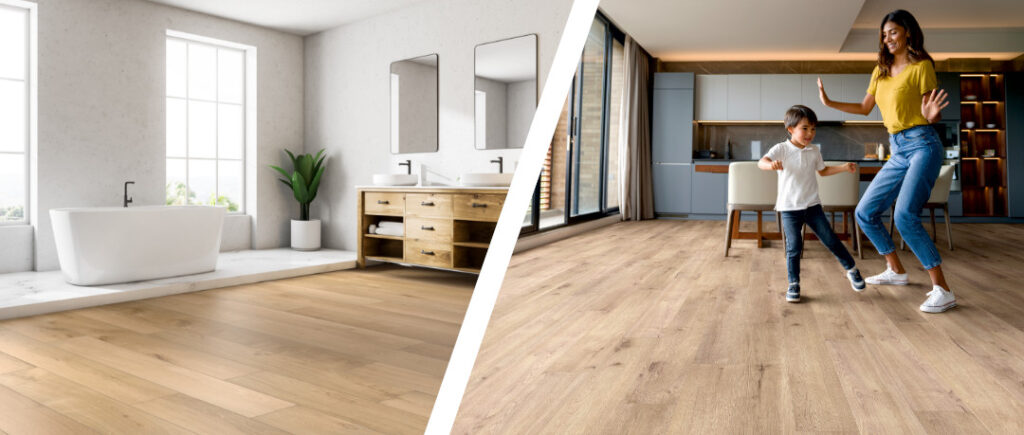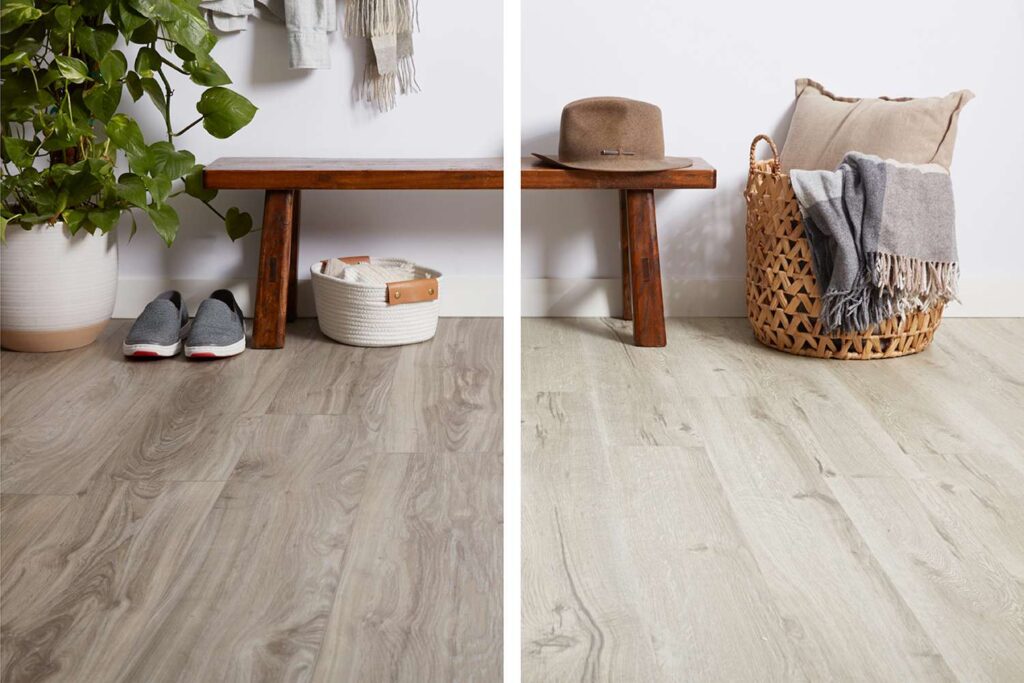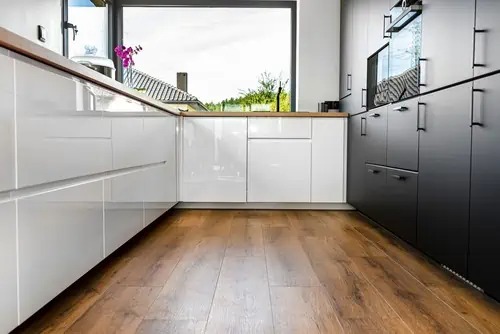When choosing flooring for your home or business, one of the most important factors to consider is the thickness of the material. SPC flooring, a popular choice for its durability, water resistance, and ease of maintenance, comes in various thicknesses that directly impact its performance. But how thick should SPC flooring be to meet your needs? Is thicker always better, or do you need to find the right balance for your specific space?
SPC flooring comes in a range of thicknesses, from 3mm to 8mm and beyond. Thicker flooring provides greater stability, sound insulation, and durability, while thinner options are more flexible and cost-effective. This guide will help you determine the ideal thickness for your needs.
Choosing the right thickness of SPC flooring is essential for achieving optimal performance. A thicker floor might seem like the obvious choice, but understanding your space’s needs—whether it’s a high-traffic commercial area or a quiet bedroom—can help guide your decision. Let’s dive into the details of how the thickness of SPC flooring impacts its use in different environments.
1. O que é o pavimento SPC e qual o impacto da espessura no seu desempenho?

SPC flooring, or Stone Plastic Composite, is a type of rigid vinyl flooring composed of a core made from limestone and PVC. This composition results in a durable and waterproof floor that’s perfect for high-traffic areas, moisture-prone spaces, and even residential use. The thickness of SPC flooring plays a crucial role in its performance, affecting durability, comfort, and sound insulation.
SPC flooring consists of multiple layers, including a stone composite core. Its thickness influences its durability, sound insulation, and performance in different environments. The thicker the floor, the more stable and durable it tends to be.
- Estrutura de camadas: SPC flooring is typically made of four layers: a wear layer, design layer, rigid core (stone composite), and backing layer. The wear layer provides protection against scratches and stains, while the design layer gives the flooring its appearance (e.g., wood or stone). The thicker the core, the more rigid and durable the flooring becomes.
- Durabilidade e estabilidade: Thicker SPC flooring is generally more stable under varying temperatures and humidity levels. Thinner options might be more prone to movement, especially in areas where environmental changes are common (like basements or kitchens).
| Camada | Função | Impacto da espessura |
|---|---|---|
| Camada de desgaste | Protects the surface from scratches | Thicker wear layers offer better protection |
| Camada de desenho | Proporciona flexibilidade estética | Thickness does not significantly impact design |
| Núcleo rígido | Proporciona estabilidade e resistência à humidade | Thicker cores improve dimensional stability |
| Camada de suporte | Enhances comfort and adds moisture protection | Thicker backing layers improve comfort |
2. How Thick Should SPC Flooring Be for Different Applications?

SPC flooring comes in various thicknesses, each suited for specific applications. The most common thicknesses range from 3mm to 8mm. But how do you know which thickness is best for your specific needs? For residential and low-traffic spaces, thinner SPC (around 3mm-4mm) can be sufficient, while thicker options are ideal for commercial spaces or areas subject to heavy foot traffic.
For residential spaces, 3mm-5mm SPC flooring is typically sufficient, while for commercial spaces or high-traffic areas, thicker SPC (5mm and above) is recommended for enhanced durability and stability.
- Utilização residencial: In homes, a thickness of 3mm-5mm is usually enough for areas like bedrooms, living rooms, and dining rooms. Thinner options are lighter, easier to install, and more cost-effective.
- Áreas com muito tráfego: For spaces like kitchens, hallways, and bathrooms, thicker SPC (5mm-8mm) is recommended. Thicker flooring is more resistant to dents, scratches, and wear caused by high foot traffic.
- Aplicações comerciais: In commercial settings, such as offices, retail stores, or restaurants, 6mm or thicker SPC flooring is necessary to withstand the higher volume of foot traffic and maintain durability over time.
| Área de aplicação | Recommended SPC Thickness | Principais benefícios |
|---|---|---|
| Zonas residenciais | 3mm to 5mm | Cost-effective, easy to install |
| Áreas com muito tráfego | 5mm a 6mm | Enhanced durability, dent resistance |
| Espaços comerciais | 6mm to 8mm | Maximum durability and long-term performance |
3. What are the Different Thickness Options Available in SPC Flooring?

SPC flooring comes in various thicknesses, ranging from 3mm to 8mm. The thickness of SPC is an important factor that affects its sound insulation, impact resistance, and overall stability. Depending on your specific needs, you may choose a thinner version for low-traffic areas or a thicker version for high-demand spaces.
SPC flooring is available in different thicknesses, such as 3mm, 4mm, 5mm, 6mm, and even 8mm. Thicker SPC flooring offers better stability, sound insulation, and durability, making it ideal for high-traffic or commercial spaces.
- 3mm SPC Flooring: Lightweight and cost-effective, 3mm SPC is best suited for residential spaces where low foot traffic is expected. It offers the basic benefits of SPC, including water resistance and scratch protection, at an affordable price point.
- 4mm SPC Flooring: Slightly thicker than 3mm, 4mm SPC offers a balance between affordability and performance. It is commonly used in residential areas and light commercial spaces where durability is important, but budget constraints exist.
- 5mm+ SPC Flooring: Flooring thicker than 5mm offers superior durability, noise reduction, and dent resistance. It is ideal for high-traffic areas, commercial spaces, and environments where the floor will experience heavy usage or significant foot traffic.
| SPC Thickness | Melhor caso de utilização | Caraterísticas |
|---|---|---|
| 3mm | Residential, light commercial use | Affordable, easy to install |
| 4mm | Residential, light commercial use | Balanced cost and performance |
| 5mm+ | High-traffic, commercial spaces | Enhanced durability, better sound insulation |
4. How Does the Thickness of SPC Flooring Affect Its Durability?

One of the key benefits of SPC flooring is its durability. Thicker SPC flooring offers greater resistance to dents, scratches, and general wear and tear. This makes it ideal for commercial environments and high-traffic residential spaces. However, while thicker SPC flooring is more durable, it can be more expensive and harder to install.
The thicker the SPC flooring, the more durable and stable it becomes. Thicker floors are better at resisting damage from heavy furniture, foot traffic, and spills, making them ideal for high-demand environments.
- Resistência ao impacto: Thicker SPC flooring provides more protection against heavy furniture, dropped objects, and other impacts. Thicker floors are less likely to develop dents or scratches, especially in high-traffic areas.
- Vida útil mais longa: Because of its enhanced durability, thicker SPC flooring typically lasts longer than thinner flooring. This makes it a wise investment for areas where longevity and performance are essential.
- Isolamento acústico: The additional thickness of SPC flooring provides better sound insulation, which is particularly important in commercial or multi-family residential buildings. It helps reduce noise transmission, creating a quieter and more comfortable environment.
| SPC Thickness | Durabilidade | Performance Benefit |
|---|---|---|
| 3mm | Less resistant to dents | Good for low-traffic areas, budget-friendly |
| 4mm | Moderate durability | Ideal for light residential or commercial use |
| 5mm+ | Altamente durável | Excellent for high-traffic areas, sound insulation |
5. What Should You Consider When Choosing the Right Thickness of SPC Flooring?

Choosing the right thickness of SPC flooring depends on several factors, including the specific application, traffic levels, and budget. For residential spaces, thinner flooring may be sufficient, but high-traffic commercial areas require thicker flooring to ensure long-term durability.
Consider factors like traffic volume, moisture exposure, and the desired performance of the flooring when choosing the thickness of SPC. Thicker options are better for high-traffic or moisture-prone areas, while thinner options work well in residential spaces.
- Traffic Volume: Areas with high foot traffic, such as hallways, offices, and commercial spaces, require thicker SPC flooring to resist dents and scratches. For residential spaces with moderate use, thinner SPC can offer cost-effective performance.
- Resistência à humidade: If you’re installing SPC flooring in areas exposed to moisture, like kitchens or bathrooms, thicker options with enhanced moisture resistance can help prevent damage from spills and humidity.
- Restrições orçamentais: Thinner SPC flooring is less expensive and still offers the core benefits of water resistance and durability. However, for high-traffic or heavy-duty applications, the long-term investment in thicker SPC may be worth the additional cost.
| Fator | Thickness Consideration | Principais benefícios |
|---|---|---|
| Traffic Volume | Thicker SPC (5mm+) | More durable, longer lifespan |
| Exposição à humidade | Thicker SPC (5mm+) | Enhanced water resistance |
| Orçamento | Thinner SPC (3mm-4mm) | Cost-effective, good for residential use |
Conclusão
The thickness of SPC flooring directly influences its durability, stability, and suitability for different spaces. Whether you are renovating your home or outfitting a commercial area, choosing the right thickness of SPC flooring is crucial for achieving optimal performance. Thicker options provide better durability, sound insulation, and impact resistance, making them ideal for high-traffic areas, while thinner options are more affordable and ideal for residential spaces with lighter usage.
At Kinwin, we offer a range of SPC flooring options in various thicknesses, ensuring you get the perfect fit for your needs. Contact us today for a customized quote and explore our collection of high-quality SPC flooring!


